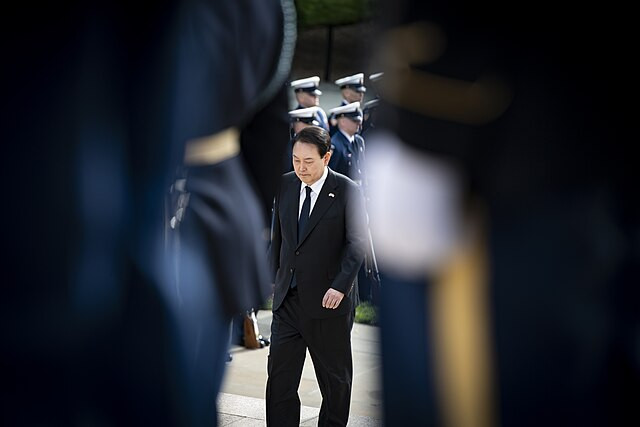nvestigators entered the official residence of South Korea's suspended President Yoon Suk Yeol early Friday morning to execute an unprecedented arrest warrant, marking a dramatic escalation in the nation's political crisis. Yoon, impeached last month after his controversial declaration of martial law, now faces allegations of insurrection and abuse of authority-charges that could carry severe penalties, including life imprisonment or the death penalty.
The Corruption Investigation Office confirmed the operation with a brief statement: "The execution of the arrest warrant for President Yoon Suk Yeol has begun." This move follows Yoon's repeated refusal to cooperate with investigators, defying three summonses for questioning. If detained, he would become the first sitting South Korean president to be arrested, deepening a political standoff that has already paralyzed the government.
The warrant stems from Yoon's surprise declaration of martial law on December 3, a decision he justified by citing threats from "anti-state forces" within the government. However, his justification lacked evidence and was swiftly overturned by lawmakers, including members of his own party, who stormed the National Assembly past military barricades to nullify the decree. Within six hours, Yoon rescinded the order, but the damage to his presidency was done. The fallout culminated in his impeachment by parliament just 11 days later.
Tensions surrounding the arrest warrant have escalated in recent days. Hundreds of Yoon's supporters gathered near his residence in Seoul, many camping overnight in freezing temperatures. Protesters held signs accusing investigators of treason and chanted slogans calling for resistance. "We have to block them with our lives," one demonstrator shouted, as others attempted to form barricades to impede law enforcement.
Inside the residence, Yoon reportedly remains defiant. In a letter to supporters, he vowed to "fight until the end" to protect the nation, a message that has galvanized his loyal base. His security detail has reportedly taken measures to delay or block the warrant's execution, raising questions about how investigators will proceed.
The situation is further complicated by Yoon's legal maneuvers. His defense team has filed multiple objections to the warrant, describing it as "illegal and invalid." They have also sought an injunction from the constitutional court to suspend its enforcement. Despite these efforts, the warrant remains valid until January 6, giving investigators limited time to act.
Yoon's presidency has been mired in controversy since his election. An ultra-conservative former prosecutor, he rose to power on a platform of rooting out corruption but has faced accusations of overreach and authoritarian tendencies. His martial law declaration reignited painful memories of South Korea's authoritarian past, drawing condemnation from across the political spectrum. Public backlash was swift, with many accusing Yoon of undermining the country's democratic institutions.
The criminal investigation into Yoon's actions during his brief martial law decree has revealed disturbing allegations. Prosecutors claim that Yoon ordered troops to forcibly enter the National Assembly to prevent lawmakers from overturning his edict. A prosecution report alleges that Yoon authorized the use of firearms to break down barricades if necessary. Former Defense Minister Kim Yong-hyun, who was arrested last month, has been charged with abuse of power for his role in the operation.
The fallout from Yoon's actions has left South Korea in political disarray. In addition to Yoon's impeachment, parliament has also voted to remove acting Prime Minister Han Duck-soo, further destabilizing the government. Finance Minister Choi Sang-mok is now serving as acting president, but the administration remains largely paralyzed as the constitutional court prioritizes impeachment cases against Yoon and other senior officials.
The constitutional court's decision on Yoon's impeachment will determine the next steps for South Korea. If the court upholds the impeachment, it would trigger a presidential election to replace Yoon. If not, Yoon could be reinstated, a prospect that has sparked intense debate among lawmakers and the public.




